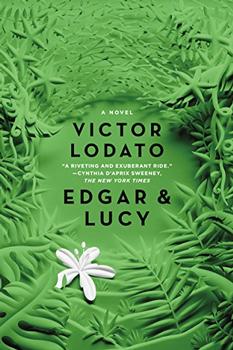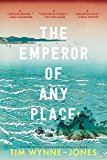Summary | Excerpt | Reviews | Beyond the book | Read-Alikes | Genres & Themes | Author Bio

The True Tale of the Monster Billy Dean is the mesmerizing coming-of-age journey of an unusual boy born in an extreme and chaotic time. The first and most impressive element of this story is the way author David Almond uses voice and language to create a spellbinding mood. Billy, the protagonist and narrator, has a dialect reminiscent of Russell Hoban's Ridley Walker – combining poor spelling skills and a unique view of things with a phonetic transliteration of a Geordie (an English dialect) accent. As readers, we must decipher the words, read slowly, let the sound and voice and story slowly seep in.
This tail is told by 1 that died at birth by 1 that came into the world in days of endless war & at the moment of disaster. He grew in isolayshon wile the enjins of destrucshon flew & smoke rose over the sitys & wile wilderness & waste crept all acros the world. He grew up with the birds & mise as frends. He wos a secrit shy & thick & tungtied emptyheded thing. He wos tort to read & rite & spel by his tenda little muther & by Mr. McCaufrey the butcha & by Missus Malone and her gosts. So he is not cleva so plees forgiv his folts & his mistayks.
The secret child of a taboo consummation between a priest and a young hairdresser, Billy's father has kept him locked in a small room for the first thirteen years of his life; he has been raised with his mother's love but in isolation from the world, without any kind of socialization. In his distinctive, unique voice—part simpleton, part wise child—Billy recreates his story for us, looking back, warning us to beware, telling us that things are not always as they seem.
Billy's father, the priest Father Wilfred, is a complicated and compromised man vacillating between pride and self-loathing. He alternates between kind, patient and loving to mean and hateful, calling Billy a monster, a cretin, an idiot, because his son seems to be slow, having a hard time learning to read and write. His father also confesses to Billy that all his actions have been born out of lust, abuse of power and cowardice. Father Wilfred was also curious to find out how Billy might grow in the conditions of secret isolation. "What did I imagine? That it would produce some kind of saint, some kind of angel, some kind of transcendent being? Ha."
Despite his father's harsh words, there is joy and love and beauty in Billy's words and memories. Like so many boys, Billy longs for his father's love and approval; he recreates his own version of a treasured ancient monastic manuscript akin to the Book of Kells, using the skin of mice he catches and his own blood. Both the original and Billy's imitation are apt metaphors for his life—these old Celtic manuscripts are referred to as Insular Art, having developed in isolation from the rest of Europe, as Billy's own skills develop isolated from the rest of his world.
Billy is thirteen when his father abandons them and Billy's mother finally lets him out of his tiny room into the war-torn ruins of Blinkbonny, the town that has been just outside his door all those years. Blinkbonny is mostly abandoned with few inhabitants left beyond the weak and crazy, but through Billy's eyes, having seen no other world, it is beautiful and wondrous. He doesn't see the world or its inhabitants in the same way the reader does—we are more wary and worried than Billy is of his surroundings and of those who are near to him. We see how in their desperation, the wounded, the lonely, the bereaved, and even the powerful, exploit innocence as a remedy for their own suffering.
The time period and setting is vague—it is wartime somewhere in the British Isles, and although the warmongers remain anonymous, there are "enjins of destrucshon" that fly over the town dropping bombs. There is reference to machinery brought in to try and rebuild the ruins, but there is no mention of any other kind of technology – phones, computers, cars, or trains, past or present.
Once out in the world, Billy's gifts reveal themselves slowly. Tutored and encouraged by the spiritualist Miss Malone, he becomes a conduit between the bereaved and their dead loved ones. As Billy's fame grows, he begins to heal the sick and injured, and soon comes to be known as the Angel Child. While others marvel at Billy's gifts, he is able to see the irony in it all:
Ha! I often feel so proud to stand ther—to lead the singing & the prares and to bring some joy wer thers been pain. Ha! I think how proud my dad wud be to see me ther with all these eyes upon me. Ha! I am becum lyk him. I am strong and strait and belovd but I stand on dust and dirt beneath the empty sky & dirt & dust are on me & weard wyld hair glittas on my head & a thin wite dusty shirt dangls down on me & nonsense danses off my tongue. Ha! Ha! Bluddy ha!
All the while, a steady sense of foreboding lies underneath while Billy longs for his father to return, longs for his father to be pleased with what he has become. And all the while, Billy warns us to prepare ourselves for what is to come. The tension rises as we wait to see what turns Billy from Angel Child to Monster.
With themes of sexuality, religion, war, and the exploitation of innocence, the novel is brilliant and troubling, moralistic, ambitious, and very accessible once you allow yourself into the world and language. Some readers might be put off by the need to decipher the misspellings and unusual dialect, but I found it got easier as I got further along into the story. Although the journey is often through a morally and spiritually dark forest, there is joy and hope with an ending that is both troubling and highly satisfying.
Published in the U.K. in 2011 as both an adult and a young-adult novel, it is being released in the U.S. as YA. I would recommend it to both adults and teens who are drawn to dark, disturbing and unusual stories.
![]() This review was originally published in The BookBrowse Review in January 2014, and has been updated for the
March 2015 edition.
Click here to go to this issue.
This review was originally published in The BookBrowse Review in January 2014, and has been updated for the
March 2015 edition.
Click here to go to this issue.

If you liked The True Tale of the Monster Billy Dean, try these:

by Victor Lodato
Published 2018
A new literary novel from Weissberg Award winning playwright and PEN USA Award for Fiction winning writer Victor Lodato, Edgar and Lucy is a masterfully written story of a broken family struggling to stay together.

by Tim Wynne-Jones
Published 2017
The ghosts of war reverberate across the generations in a riveting, time-shifting story within a story from acclaimed thriller writer Tim Wynne-Jones.
Your guide toexceptional books
BookBrowse seeks out and recommends the best in contemporary fiction and nonfiction—books that not only engage and entertain but also deepen our understanding of ourselves and the world around us.